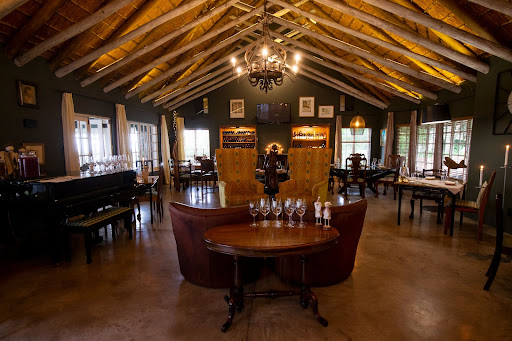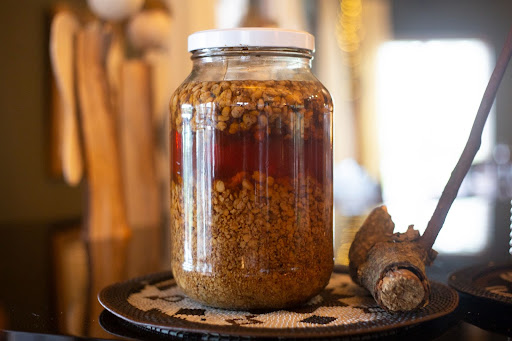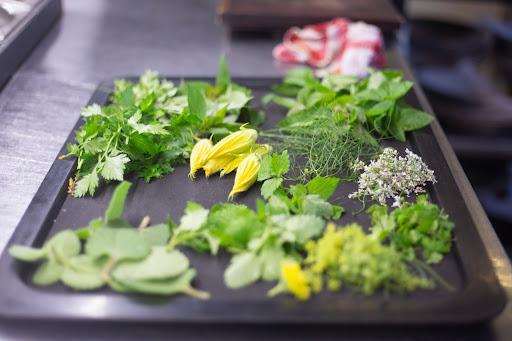Sustainable kitchen: Chef Johannes Richter is a partner in The LivingRoom. Proteins such as meat and fish are from local or regional sources. (Photos: Rogan Ward)
UPDATE: The LivingRoom at Summerhill Guest Estate has won Restaurant of The Year at the Eat Out Woolworths Restaurant Awards.
Johanna and Johannes Richter at Summerhill Estate’s The LivingRoom restaurant outside Durban share a buzzing symbiotic energy that appears creative and “couple-y” — as if The Clash frontman Joe Strummer had married the group’s lead guitarist, and his most consistent song-writing collaborator, Mick Jones.
The Richters don’t complete each other’s sentences. Instead, they weave in and out of each other’s thoughts and memories like a conversation between instruments in a punk-jazz quartet.
At one point Johannes is describing a dessert based on a rice pudding that has recently been added to the menu and the attempts to get the essence of the caramelised smoky crust at the bottom of the rice pudding pot into the ice-cream. The rice pudding is a favourite from summers spent on his grandparents’ self-sufficient smallholding in Hungary and he segues into that foundational experience — of grown fruit to make jams and schnapps, vegetables and livestock for eating, learning how to slaughter by hand for charcuterie and cooking, before ruminating on the power of nostalgia in taste and eating.
“Those kinds of things I think also have a big influence on what we do today [in terms of sustainable cooking] and on our outlook on what good food is,” he says before checking himself. “Wait, I lost track of what I was saying …”
“Your grandmother, she did a rice pudding?” Johanna says.
Johannes returns to the recipe, which includes rhubarb for acidity, before reflecting on what Johanna had said previously about the comfort of memory that food engenders.
“Food plays a big role in that, almost taking you back to these warm untroubled times,” he says.
The couple then frenetically discuss one guest who exclaimed that a dish had returned him to his four-year-old self and some elders, at a Hindu wedding that the LivingRoom hosted, who proclaimed the homemade mango atchar was exactly as their grandmother used to pickle it.
Theirs is a duet that translates effortlessly into the LivingRoom, an unpretentious fine-dining restaurant that has put Cowie’s Hill, the more salubrious part of the otherwise grimy light industrial area of Pinetown to the west of Durban, on the gastronomic map.
 Heirloom: The LivingRoom restaurant is part of the Richters’ family home at Summerhill Estate.
Heirloom: The LivingRoom restaurant is part of the Richters’ family home at Summerhill Estate.
Johannes is in the kitchen while Johanna works front of house and selects the restaurant’s very thoughtful collection of wines. A combination which has led them to be the only KwaZulu-Natal eatery to feature in the Top Twenty of Eat Out magazine’s prestigious — but self-appointed, Western Cape-centric and troublingly unadventurous fine-dining focused — annual awards in 2019.
Johannes was also one of the magazine’s Rising Star nominees that year. This was a mere two years after the couple had set up the restaurant at Johannes’s childhood home, which was converted into the Summerhill Estate guesthouse by his parents several years previously. The guesthouse’s expansive grounds are perched up on a hill with sweeping views of Durban. The Richters’ rigorous commitment to sustainability is apparent as we walk around their herb and vegetable gardens, which produce everything from sweet potatoes to Judas ear mushrooms.
There are indigenous trees whose fruit, like umdoni (Syzygium cordatum or waterberry) and amatungulu (Carissa macrocarpa or Natal plums) will be incorporated into recipes or pickled or fermented. Other trees not endemic to the area, such as the marula (Sclerocarya birrea), provide wood for smoking charcuterie and vegetables.
 Wood used in the restaurant for various reasons comes from the property
Wood used in the restaurant for various reasons comes from the property“All the wood used in the restaurant is from the property. A lot of energy goes into tree growing so why should I dump it and not respect it?” says Johannes.
There are plump chickens lazing in the spacious shaded coop, their eggs to be used in recipes. Johannes says only the breakfast menu uses eggs not sourced from their own chickens.
The chickens eat the scraps from the kitchen and their droppings are used as compost.
The couple say they were “super-idealistic” about what they wanted to achieve when they moved here from Germany in 2017. Johannes has lived in South Africa since the age of three, when his parents immigrated in 1991 for his father’s health. He returned to Germany as a 20-something to apprentice in kitchens. He met Johanna, who is Austrian, in 2014 at a three-star Michelin restaurant in Berlin, the Restaurant Rutz, where they were both working.
“With the sustainability aspect vegetables play the biggest role, you can greenwash beef as much as you like but a kilogram will still have thousands of litres of water and CO2 emissions,” says Johannes.
He adds that because of the “luxury and lifestyle attachments” that South Africans have with meat, they expect more of it on the menu, especially at the “comparatively” high cost of their five and seven course set menus (respectively R590 or R965 with wine-pairing and R730 or R1 255), which remains cheaper than many inferior restaurants in the Western Cape and Gauteng.
 Sustainable kitchen: The Richters create dishes using vegetables that are either grown in their garden or are bought from local small farmers.
Sustainable kitchen: The Richters create dishes using vegetables that are either grown in their garden or are bought from local small farmers. “After three courses of vegetables, guests are sometimes like ‘Oh, sorry, we didn’t order the vegetarian menu’,” says Johanna with a laugh.
“Sometimes Johanna and I are like: ‘Are we polarising a bit too much here? Is this a little bit too provocative for what we are doing?’ But people come back, so that’s okay.”
The restaurant’s sustainability efforts are based on basic tenets such as food efficiency with the use of whole carcasses, preserving seasonal food and produce, reducing carbon dioxide emissions by using vegetables, sourcing local and regional meat and fish and waste recycling.
Johanna happily chirps that they produce considerably fewer rubbish bags for the landfill than their neighbours — all family homes.
The few ingredients not from their garden come from local producers, neighbours and guests, even. This means The LivingRoom doesn’t “have standardisation at all. We don’t rely on a catalogue where we order products. If we are lucky enough when someone comes to us with good produce, that makes the menu immediately because we want to showcase it as well as it can be”, says Johannes.
But this means more work; every step of production “has three more steps behind it”, says Johannes.
“So the creative side has to be quick, the functional side has to be quick, and I think that’s what cooking is about. To go through a catalogue and order luxury items and then put them into constellations that you can get in similar ways all over the world, where is the identity in that? Cooking is about getting fresh produce in — to a certain degree preferably local — and to try to showcase a space in time.”
Johannes had a “very, very classical French apprenticeship” in Strasbourg at a family run restaurant with a single Michelin star. He says this means his sauces are the foundation of his plates. But he also draws on Japanese techniques such as making shoyu and introduces Durban into this mix of influences, too.
 ohannes Richter spends time learning about plants and herbs from traditional healers and elders in the South Coast and the Wild Coast.
ohannes Richter spends time learning about plants and herbs from traditional healers and elders in the South Coast and the Wild Coast.Johannes forages and spends time learning about plants and herbs from traditional healers and elders on trips to the South Coast and Wild Coast. Members of his team from different cultural backgrounds also contribute to what sounds like a robust kitchen conversation about heirloom plants.
This leads to dishes like bushpig belly with crackling, miso mayonnaise, pickled wood ear mushrooms, celeriac and foraged mushroom chips and powder, all with a pork broth.
Or calabash stuffed with porcini mushrooms and Belnori goat’s cheese, with the porcini presented in four forms — as a sauce, a puree, pickled and raw.
Johanna brings out a jar of umami deliciousness to illustrate the attention to locality and fusion.
Johannes explains: “We do a lot of fermenting and with this project, which is ongoing for about one-and-a-half years, we have been trying to pack Durban as a cultural melting pot into shoyu, into a soya sauce.
“We have used sorghum as a Mother African grain — whereas in Japan, classically for a shoyu or soy sauce, wheat and soya is used — and then we have used dhal to bring in the other, more Eastern side of Durban. It’s about seven months old and we introduced it to the menu about a month ago.”
Johannes says “It’s about getting a bit of the pride of the city out there because everyone is so hush, hush about Durban and everyone understates themselves here.”
Johannes Richter’s favourite things to do in Durban
Catch local jazz:
Listening to the immense local talent and winding down with South African jazz is what nourishes the soul for Johanna and I. Our favourite spots are the Rainbow Restaurant and Jazz Club which is down the road from TheLivingRoom in Pinetown (23 Stanfield Lane, Tel: 031 702 9161) or The Chairman (146 Mahathma Gandhi Road, Durban; Tel: 079 753 6313)
Local eateries:
Maha Cafe
This spot serves serious soul food with the years of experience of head chef Charlie Lakin showing in every dish. Charlie also forages for many of his ingredients and pays special attention to history and locality in his cooking. (5 Mahathma Gandhi Rd, Durban. Tel: 082 817 2957)
Glenwood Bakery
With a couple of bottles of lovely wine from our cellar, their Monday pizza nights are a regular feature for the whole family. We take our Italian food seriously and and we can honestly say that the pizza is legit’. Their Fior de Latte cheese being a nostalgic game-changer. (398 Esther Roberts Rd, Glenwood. Tel: 082 617 9768)
The beach:
Whether it’s the water (diving or spear-fishing) or celebrating some family time on the beach, we love driving south of eThekwini to the pristine beaches situated there.